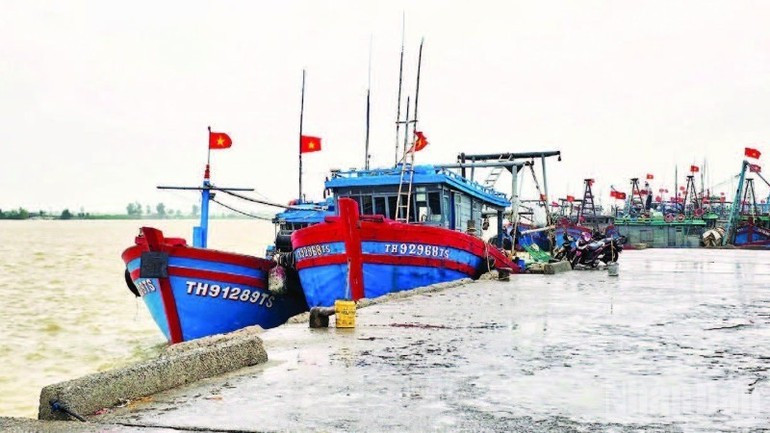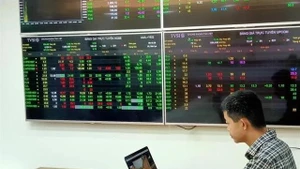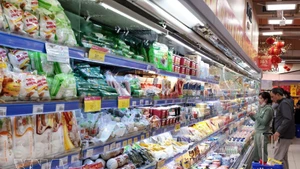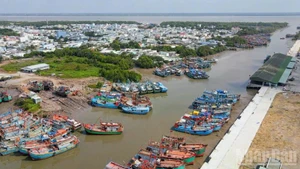
Improving the legal framework and tightening vessel management
Speaking to Nhan Dan Newspaper about the progress made in addressing the “yellow card” warning on Vietnamese seafood, Deputy Minister of Agriculture and Environment Phung Duc Tien said that since the European Commission (EC) issued the warning on October 23, 2017, Viet Nam has synchronously implemented numerous measures to gradually refine the legal framework, strengthen vessel management, enhance traceability, and strictly handle violations. After more than eight years of efforts, the warning has not yet been lifted, but positive changes have created an important foundation for Viet Nam to enter the decisive phase.
In recent years, Viet Nam has promulgated and updated a consistent system of legal documents, including 11 circulars, two decrees, and various directives of the Party and the Government. Following Document No. 81-CV/TW dated March 20, 2020 and, in particular, Directive No. 32-CT/TW dated April 10, 2024 of the Party Central Committee’s Secretariat on strengthening leadership over the fight against IUU fishing, the Government issued Resolution No. 52/NQ-CP to implement the tasks, along with Resolution No. 04/2024/NQ-HDTP of the Council of Judges of the Supreme People’s Court, guiding criminal handling of illegal fishing activities.
According to Deputy Minister Phung Duc Tien, since the Prime Minister gave direct leadership, vessel management has seen strong improvements. National vessel data have been unified among VNFishbase, the Ministry of Public Security and the Ministry of National Defence, with a total of 79,360 vessels, including more than 7,000 vessels of 15m or longer, and more than 4,000 vessels of 24m or longer.
Localities have strictly controlled vessels, ensuring that no vessel leaves port without meeting required conditions; they have also completed registration, inspection, licensing and updating of data into VNFishbase, ending the situation of “three-no” vessels. Nearly 100% of fishing vessels have installed vessel monitoring systems (VMS), except those temporarily suspended or pending decommissioning. The VMS system allows comprehensive monitoring from departure and offshore operation to port arrival.
Localities are also installing VMS for vessels from 12m to 15m in length, piloting electronic logbooks, digitising, and assigning vessel identification via VNeID, and developing plans to dismantle non-compliant vessels while supporting fisher livelihoods.

Ready to welcome the EC inspection team
Viet Nam is completing efforts to connect VNFishbase, electronic logbooks, the electronic traceability system, and VMS, linking them with administrative procedures to build an integrated system for fisheries management.
On traceability, the electronic system has been rigorously implemented from fishing operations and the issuance of diverse certificates. Enforcement for imported seafood under the Agreement on Port State Measures has also been tightened across 51 designated ports
Notably, long-standing backlogs in administrative violation handling have been resolved, with only 0.33% of cases still pending. Viet Nam is also reporting and explaining to the EC regarding the handling of foreign vessels violating Vietnamese waters and the traceability of certain seafood products.
Assessing the prospects of lifting the “yellow card”, Deputy Minister Phung Duc Tien said Viet Nam has submitted scenarios to the Government for working with the EC, and affirmed that the tangible achievements in recent years have strengthened confidence in a transparent, responsible, and internationally integrated fishing industry.
The fight against IUU fishing has been implemented comprehensively from central to local levels, combined with awareness campaigns and training both domestically and internationally. “With continuous efforts, the EC acknowledges Viet Nam’s strong determination and recognises the country’s ability to maintain responsible fishing with full traceability,” the Deputy Minister said.
Delivering a message to coastal localities, the Deputy Minister stressed that despite eight years of effort, Viet Nam has not yet achieved the goal of lifting the “yellow card”. Directive No. 32-CT/TW identifies this as an urgent task, requiring decisive engagement from leaders at all levels. The Prime Minister and senior leaders have conveyed a clear “combat spirit” against IUU fishing to every locality.
“With the determination of the entire political system, we believe Viet Nam will lift the ‘yellow card’, maintain a responsible fishing industry, ensure transparent traceability, and achieve sustainable development in line with Directive No. 32,” Deputy Minister Phung Duc Tien affirmed.















